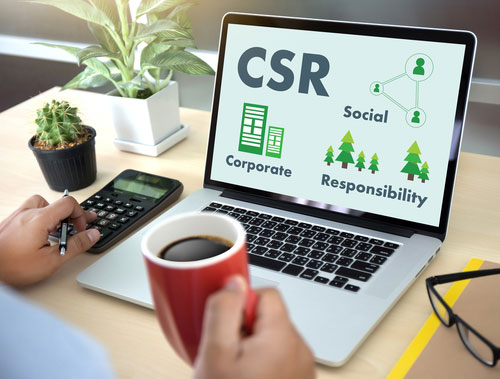CSR: definition, history, worldwide, issues and evolution of CSR. Discover everything there is to know about CSR: from its definitions to the different contexts under which it is used.
Definitions Of CSR
A Simple Definition Of CSR
What is CSR, or Corporate Social Responsibility? CSR encompasses all the practices put in place by companies in order to uphold the principles of sustainable development. And what does it mean to be a sustainable or responsible organization? It means that companies need to be economically viable, have a positive impact on society, and respect and preserve the environment.
But other, more complex definitions may be given by some institutions.
- Related:
European Union’s Official Definition Of CSR
The European Union, in an attempt to offer a framework for companies wishing to invest in sustainable development, published in 2001 a Green Paper on Corporate Social Responsibility defining CSR as:
“The voluntary integration of companies’ social and ecological concerns into their business activities and their relationships with their stakeholders. Being socially responsible means not only fully satisfying the applicable legal obligations but also going beyond and investing ‘more’ in human capital, the environment, and stakeholder relations.”
ISO 2600 Official Definition Of CSR
The International Organization for Standardization (ISO) is an international standard-setting body that also addressed the definition of CSR through its ISO 26000 standards on Corporate Social Responsibility. In these guidelines, ISO defines CSR as:
“The responsibility of an organization for the impacts of its decisions and activities on society and the environment, resulting in ethical behavior and transparency which contributes to sustainable development, including the health and well-being of society; takes into account the expectations of stakeholders; complies with current laws and is consistent with international standards of behavior; and is integrated throughout the organization and implemented in its relations.”
CSR Definition And ESG Definition: What’s The Difference?
Although CSR and ESG are often used as if they were the same, they’re not. Yes, both follow the principles that profit isn’t all that matters and that corporations must protect society and the environment, contributing to sustainable development. However, their approach and target are not the same.
While CSR is about a company’s engagement with its stakeholders and its commitment to socially and environmentally responsible practices. On the other hand, ESG is a capital market term used by investors that represents the environmental, social and governance criteria under which they’ll assess a company’s responsible practices.
- Related:
CSR And Sustainability: What’s The Connection?
CSR is definitely based on a sustainability mindset. Yet, it is especially based on what companies can do to help reach a sustainable development path. However, there are other circumstances under which we can act in a sustainable way – from the way people use technology to the food they eat, the transportation means they use or the way they commute. The clothes people buy, how they organize their houses and their consumption is also related to sustainable and responsible behaviors. If you’re interested in knowing more on this we recommend you dig into our sustainability piece.
- Related:
CSR And Impact Measurement
Increasingly, all stakeholders, from consumers to investors or employees are closely looking at how companies are helping to tackle the world’s main risks. They expectations corporations to have CSR strategies that help them be a force for good are contribute to solving issues such as soil erosion, ocean acidification or the lack of hygiene in developing countries. However, random actions of solidarity aren’t enough.
The expectations are that businesses have a plan, share it in their CSR reports and that they effectively measure the impacts they have and show proof of how they are helping the world to sustainably develop.
CSR: History And Origin Of CSR (Corporate Social Responsibility)

The idea that companies must do CSR and play an active role in the sustainable development fight has its roots in the work of some American managers in the 1950s. What was their idea? They thought that if companies no longer focused only on their profits but also on the impact they have on society and the environment, they’d have other kinds of benefits.
For example, if a company pays its employees better, it may spend more on paying for salaries but on the other hand its workers purchasing power increases and so do the chances that they buy the company’s products. As well, if a company better manages its environmental impacts, it will save money in the short term by avoiding fines and in the long term by bypassing the necessity to manage natural disasters.
In 1953, Howard Bowen published a book entitled “The Social Responsibility of the Businessman” in which he explains why companies should be interested in being more socially and environmentally accountable and gave the first “recognized” definition of CSR.
Moreover, with the development of environmental concerns in addition to economic and social issues in the second half of the 20th century, corporate (social) responsibility became a growing issue. More and more consumers started becoming critical of companies and wanted them to be more respectful of the laws, the environment, and more responsible in general.
- Related:
The Development And Institutionalization Of CSR
In the 1990s and 2000s, governments in several countries around the world started putting in place regulations that created the foundations for modern CSR. In France, NRE laws were the first to force companies to communicate their performance in terms of sustainable development. These laws were then followed by various regulations such as the Grenelle Laws or the Laws of Vigilance.
Afterward, companies started becoming aware of the need of starting to invest in CSR so that they didn’t stay behind their competitors. At this point, CSR started to be seen and used as a tool for management, communication, and business development. CSR became also essential in improving corporate image among consumers, enhancing internal communication and productivity and was a way of reducing costs by turning organizations more efficient when it comes to managing energy and resources.
Today, as the world faces many social and ecological challenges, it’s hard to find medium/big size companies that don’t have a CSR report, a CSR department or a person in charge, or at least a communication strategy dedicated to CSR.
- Related:
The Path Of CSR And The CSR Tools Used Today
Many tools are being developed to enable companies to better quantify their performance and actions in terms of sustainable development. For example, companies now use LCA (Life Cycle Assessment) to quantify their greenhouse gas emissions and their impacts on the environment and make CSR or sustainability reports to assess and share their positive and negative contributions to the environment and society. Some do it because it’s mandatory (for instance, by the EU, if they’re big companies) or because they want to improve their reputation and employer branding.
CSR Today: Definition Of The CSR Approach Of Companies Nowadays

Today, the corporate world has started to truly institutionalize CSR. CSR approaches and strategies refer to the various policies put in place by companies that make them more resilient and at the same time allow them to protect the environment, reduce greenhouse gas emissions, improve the quality of products or promote social inclusion and workforce equality.
Overall, a CSR approach has the potential to impact many different areas within business internal structures and also in the way the outer workforce and society are organized. Below are some examples of CSR applied to different categories.
CSR And The Environment
Environmental issues are increasingly central to CSR. Climate change is likely to bring along several risks over the next years like extreme weather events, water levels rise or climate refugees. Therefore, companies betting on CSR practices understand how important their help is to protect people, biodiversity and ecosystems services.
In fact, more and more companies are including environmental concerns in their internal management systems to decrease resource consumption (often using circular economy principles), better handle waste or use energy more efficiently. Some are even using biomimicry principles (imitating nature) to create new and durable designs (eco-design) for their products. Furthermore, ISO 14001 standards have been specifically created to help companies set up an environmental management system in the framework of CSR. Some examples of actions that can be taken:
- Implementing a program to reduce corporate paper consumption
- Learning how to use your digital tools in an eco-friendly way and work from home
- Learning how to use laptops in an eco-friendly way and make batteries last longer
- Developing a business travel plan to promote non-polluting transportation;
- Reviewing the supply chain of businesses, responsible for 90% of their environmental pollution affecting issues like melting permafrost
- Establishing a plan to reduce energy consumption, betting on renewable energies such as photovoltaic panels and reduce greenhouse gas emissions
- Eco-designing products (design products that better respect the environment and can reused and re-purposed before being recycled)
- Taking care of soils by using regenerative practices and joining the organic movement
CSR And Social Issues
At the same time, organizations betting on CSR strategies also consider how they can help the development of society. This includes both their employees and the people along the business value-chain. Some examples are:
- Establishing an ethics charter against corruption and having a good governance system
- Developing an ethical supply chain (fight against child labor or unfair wages, for example)
- Increasing company employees’ compensation via restaurant vouchers or other benefits like a company’s shares
- Integrating CSR within the HR strategy
- Establishing prevention/health and well-being programs at work in the company
- Taking care of the employees’ ergonomics at work
- Raising consumer awareness about responsible consumption
- Financially assisting and helping social associations or NGOs
- Supporting museums, exhibitions or other cultural shows from local groups
- Participating in social inclusion programs at a local level
- Allowing company employees to share their skills, knowledge and time for free
- Participating in humanitarian programs (in terms of finance or logistics)
CSR And Conscious Leadership
There are some companies that are truly re-designing their business models and their operations. Companies that are working the extra mile to fight climate change and that have been able to get to develop a corporate culture where everyone is inspired and motivated to work towards the goals of sustainable development. They’re not just talking the talk and announcing a couple of changes to engage consumers – they’re truly walking the walk.
Behind these companies, we can usually find conscious leaders. These are people who lead instead of managing, who are aware of their higher purpose, how human complex systems are connected to the global natural world complexity. They acknowledge their limitations and their fears and aren’t afraid of judgment, embracing true transparency that others recognize and want to follow.
CSR In The World Today

On a global scope, there is no “law” that forces companies to put in place a CSR strategy. Nevertheless, many states have developed a set of regulations that frame CSR, in particular by encouraging companies to be more responsible.
On the other hand, there is an international institution that publishes guides for companies to guide them on their CSR strategy. The ISO (International Standard Organization) allows companies to have a common frame of reference in order to implement their CSR strategy.
- Related:
- Definition of the ISO 26000 CSR Standard
- ISO 14001 standard definition on environmental management in the context of CSR
- Definition of the ISO 9001 quality standard in the context of CSR
- Definition of the ISO 50001 standard on energy management
CSR Regulation And Standards In Europe
Overall, there is no standard in European countries that defines CSR performance standards as such. For example, despite the fact that some government regulations are being developed and implemented, as was the case with the fossil fuels tax in France, there are no global CSR laws. For instance, there is no such policy that requires companies to reduce their greenhouse gas emissions or that forces them to implement a waste reduction strategy.
On the other hand, big and public interest companies must communicate extra-financial information about how they’re handling with their environmental and social, challenges, according to EU’s 2014/95 Directive.
There are still some countries like France that can count on the support of public institutions like as ADEME and AFNOR. These organizations are responsible for supporting companies in their CSR and sustainable development quests and often act as a connection for the development of ISO standards.
- Related:
CSR And CSR Standards In The United States
CSR in the United States is based on a different conception of responsibility than the one often prevailing in European countries. Whereas in Europe, CSR is largely governed by regulations, standards and good practices (a sort of institutionalized CSR), the definition of CSR in the United States is vaguer in legal terms. Thus, in the US, a more philanthropic and individual conception of corporate responsibility is the one that prevails, where business as usual is seen as “normal” and taking some profit to help society or the environment is often concerned as an act of charity.
- More information on CSR in the United States in our article: CSR in the United States.
- Check also our piece: What Are The 100 Most Sustainable And Responsible Companies In America?
CSR And CSR Standards In China
CSR in China is booming. This is a country that’s setting up more controls and regulations on the responsibility of its enterprises, but also a nation where the image and reputation of companies is strongly linked to its capacity to improve social welfare or to invest in causes. The omnipresence of social networks in the middle-class population makes CSR an increasingly important issue for the reputation of Chinese companies.
CSR And CSR Standards In India
From a highly centralized definition of CSR, India has moved to a more traditional and liberal approach to CSR. Today, however, the principle of philanthropy rooted in Indian philosophy (and resulting from the Gandhian tradition) continues to bear its fruits. CSR is extremely dynamic in India which, just like China, seems to have a bright CSR future ahead.
- More information on CSR in India in our piece: CSR in India (French version)
CSR And CSR Standards In Brazil
- More information on CSR in Brazil in our piece: CSR in Brazil (French version)
CSR And CSR Standards In Scandinavia
- More information on CSR in Scandinavia in our piece: CSR in Scandinavia (French version)
CSR Trends Today
At present, CSR is evolving. Companies seek to define new ways to contribute to sustainable development in order to improve their image, but also their performance and their chances of investment and thriving in the long term. CSR is also benefiting from technological and economic developments and the best practices today are likely to change very rapidly.
- Related:
CSR Communication
CSR communication is one of the most considered and adopted areas in recent years. Companies are looking for new ways to make their efforts known, to have the public value them, and to account for their image in terms of CSR.
- Related:
CSR And Human Resources
- Related:
CSR And Supply Chains
CSR in SMEs (small and medium-sized enterprises)
The definition of CSR in SMEs is specific to SMEs as CSR is essentially a concept for large companies. For example, in Europe, most of the standards that define CSR are intended for large or even very large companies: reporting is an obligation for companies with more than 500 employees.
Moreover, in the context of an SME with limited resources, investment in CSR may seem difficult or even unnecessary. But in reality, CSR is increasingly defined as a management and performance tool for SMEs. The return on investment of CSR for SMEs is strong, and more and more tools can be used for companies to get started with CSR.
Other Definitions Related To CSR
Climate change? The circular economy? Biodiversity? Renewable energies? Biogas? ESG? Find them all in our CSR Dictionary.